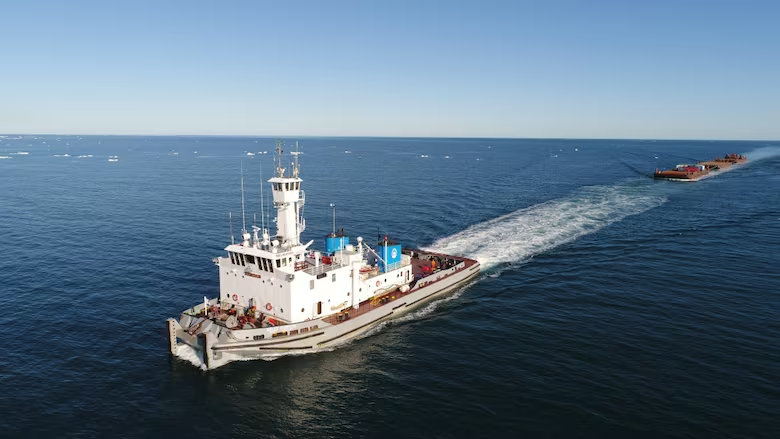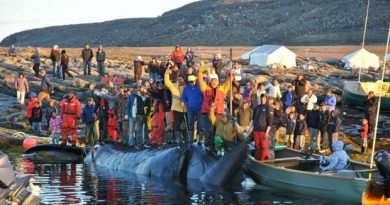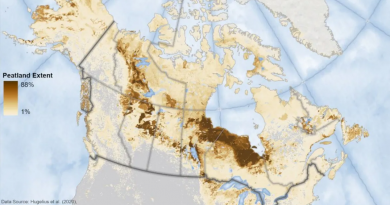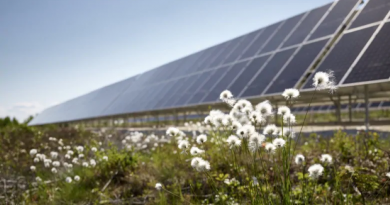Backup plan for N.W.T. barge season underway, says gov’t

“It’s dependent on the Coast Guard co-operation for this,” GNWT says.
The N.W.T. government plans to use the N’Dulee ferry crossing near Wrigley as a base to ship goods up the Mackenzie River to Sahtu communities, if barges can’t make it up the river again this summer.
“It’s still up in the air,” Terry Camsell, the director of Marine Transportation Services (MTS), said of the plan — which hinges on water levels.
The barge season usually runs from June to October. Each year, barges deliver supplies and fuel to communities that otherwise aren’t accessible at this time of the year. In the last two years, low water levels worsened by severe drought have forced multiple barge cancellations.
Camsell said this season, he is hopeful, as water levels are about 30 centimetres higher than they were at this time last year.
He said Marine Transportation Services is monitoring and working closely with the N.W.T. Department of Environment and Climate Change’s hydrologists to determine whether barging will be viable this year.
Camsell said the whole system depends on the Canadian Coast Guard, which places buoys on the river. That’s critical for marine vessels to navigate safely.
“If they can’t do that because [of] low water, then we can’t operate,” Camsell said.

Jeremy Hennessy, a spokesperson for the Canadian Coast Guard, said in an email that it is a little early to say if there will be any barge cancellations — with ice still on Great Slave Lake and the Mackenzie River, the coast guard has not yet begun installing buoys.
“[The Canadian Coast Guard] will assess water levels once the ice is off the river and begin its spring buoy tending operations when it is safe to do so,” Hennessy said.
If the water levels are low, Hennessy said the coast guard will “adjust its operations as necessary to reflect the conditions of the river.”
What if barges can’t operate?
In normal conditions, Camsell said, goods are usually trucked from Enterprise to Hay River, since the railway service closed down. From there, they are loaded onto MTS barges and are shipped to communities along the Mackenzie River.
Camsell said MTS and Canadian Coast Guard ships are stationed in Hay River. When water levels are low in Great Slave Lake, getting through the rapids around Fort Providence becomes a problem. In such conditions, they are unable to operate on the entire Mackenzie River.
“So we physically can’t get down the rapids to get to Fort Simpson and the N’Dulee ferry crossing,” Camsell said.
He said the backup plan — trucking cargo to the N’Dulee crossing instead — would mean they would use a charter company, Cooper Barging, to ship the goods via barge and tugboat from that crossing to some Sahtu communities.
For that plan to work out, Camsell said, they would still need the coast guard’s help setting up some buoys on that stretch of the river.
“It’s only a small stretch of the river, but we need about 30 buoys put in there,” Camsell said.
Camsell said he will be meeting with the coast guard this week to talk about the plan further, but nothing is finalized yet.
“That would enable us to do a delivery to the Sahtu region … We still have a lot of work to do and it’s dependent on the coast guard co-operation for this,” Camsell said.
For communities in the Inuvialuit Settlement Region, Camsell said they will carry deliveries out of Tuktoyaktuk.
Sahtu leaders aren’t as optimistic
Norman Wells Mayor Frank Pope said he hasn’t heard anything from MTS about any plans yet.
“[I] doubt we will have barge service,” he said, though he added his community has enough supplies to last the season.
Last fall, the town declared a local state of emergency as it grappled with increasing fuel costs in the wake of barge cancellations. To prepare for another summer of possible barge cancellations, a significant amount of fuel supplies, construction materials and a year’s worth of groceries were trucked in by winter road to many Sahtu communities.
Danny McNeely, MLA for the Sahtu, said he thinks recent water levels and reports from Environment and Climate Change mean chances of a barge season look bleak.
“I don’t think we’re going to see a barging service this year,” McNeely said.
Tulı́t’a Mayor Douglas Yallee said they, too, have enough heating fuel and aircraft for now, but groceries could be a problem if barges don’t arrive.
“If need be, it’ll have to be flown in and that’s when the prices will go up,” Yallee said.
Yallee said it’s getting harder to predict water levels each year.
No long-term plans yet
Looking ahead through that uncertainty Yallee described, Camsell said there is no long-term solution in place just yet if water levels keep being low.
He said it’s not unusual for water levels on the Mackenzie River to fluctuate, but if this trend continues, they’ll have to look at other options.
“We don’t have [a solution] right now, but we’re definitely looking at that if the need arises, for sure,” Camsell said.
“We haven’t gone there yet. We still want to have an operation on the Mackenzie River and we’ll do everything we can to make sure that that keeps going.”
Related stories from around the North:
Canada: N.W.T. gov’t to help cover shipping costs to communities after barge cancellations, CBC News



